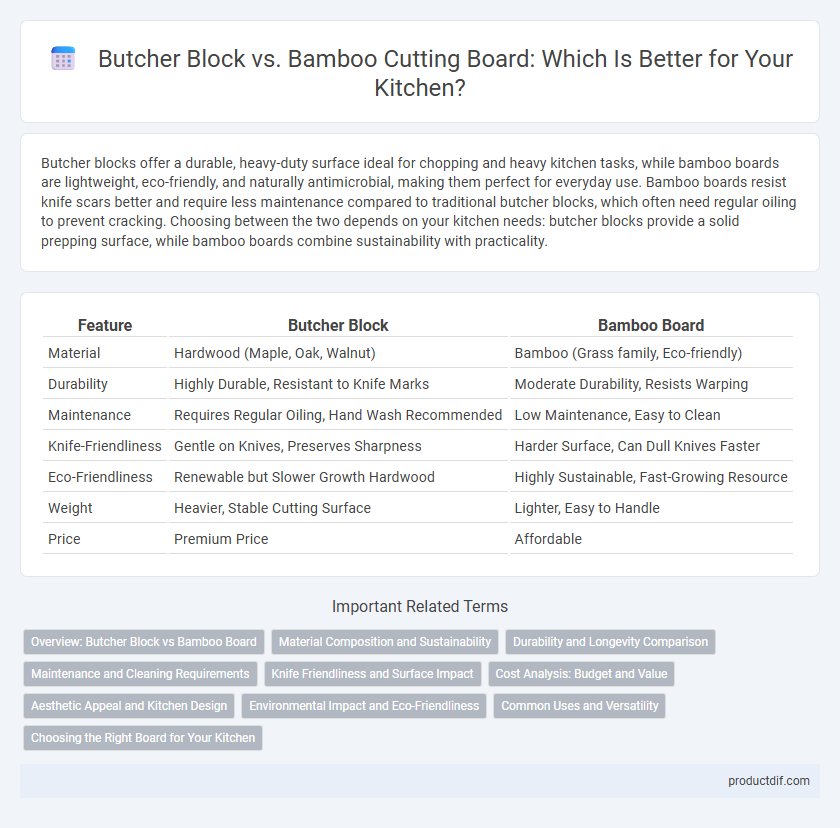Butcher blocks offer a durable, heavy-duty surface ideal for chopping and heavy kitchen tasks, while bamboo boards are lightweight, eco-friendly, and naturally antimicrobial, making them perfect for everyday use. Bamboo boards resist knife scars better and require less maintenance compared to traditional butcher blocks, which often need regular oiling to prevent cracking. Choosing between the two depends on your kitchen needs: butcher blocks provide a solid prepping surface, while bamboo boards combine sustainability with practicality.
Table of Comparison
| Feature | Butcher Block | Bamboo Board |
|---|---|---|
| Material | Hardwood (Maple, Oak, Walnut) | Bamboo (Grass family, Eco-friendly) |
| Durability | Highly Durable, Resistant to Knife Marks | Moderate Durability, Resists Warping |
| Maintenance | Requires Regular Oiling, Hand Wash Recommended | Low Maintenance, Easy to Clean |
| Knife-Friendliness | Gentle on Knives, Preserves Sharpness | Harder Surface, Can Dull Knives Faster |
| Eco-Friendliness | Renewable but Slower Growth Hardwood | Highly Sustainable, Fast-Growing Resource |
| Weight | Heavier, Stable Cutting Surface | Lighter, Easy to Handle |
| Price | Premium Price | Affordable |
Overview: Butcher Block vs Bamboo Board
Butcher blocks, typically crafted from hardwoods like maple or oak, offer durability and a robust surface ideal for heavy chopping and cutting tasks, while bamboo boards are known for their eco-friendliness and natural antimicrobial properties. Bamboo boards are lighter and often less prone to knife scarring, making them suitable for everyday use and easy maintenance. Both options provide sturdy surfaces, but butcher blocks excel in longevity and resilience, whereas bamboo boards emphasize sustainability and ease of care.
Material Composition and Sustainability
Butcher blocks are typically made from hardwoods like maple, oak, or walnut, offering durability and a dense grain that resists knife marks, while bamboo cutting boards are crafted from fast-growing bamboo grass, making them lightweight and naturally antimicrobial. Bamboo's rapid renewability and low environmental impact enhance sustainability compared to hardwood butcher blocks, which require longer growth periods and more resource-intensive harvesting. Both materials provide eco-friendly kitchen solutions, but bamboo scores higher for replenishment rates and carbon footprint reduction.
Durability and Longevity Comparison
Butcher blocks, typically crafted from hardwoods such as maple or walnut, offer exceptional durability and can withstand heavy chopping and cutting over years with proper maintenance. Bamboo boards, made from rapidly renewable grass, provide moderate durability but tend to be more resistant to knife scarring and moisture compared to softer woods. While butcher blocks often require regular oiling to maintain longevity, bamboo boards boast natural antimicrobial properties and quicker drying times, making them a practical choice for longevity in humid kitchen environments.
Maintenance and Cleaning Requirements
Butcher blocks require regular oiling with mineral oil or specialized beeswax to prevent cracking and maintain durability, making their maintenance more intensive than bamboo boards. Bamboo cutting boards are naturally more resistant to moisture and bacteria, requiring simple washing with warm soapy water and occasional conditioning to preserve their integrity. Proper drying is essential for both materials to avoid warping and prolong the lifespan of kitchen cutting surfaces.
Knife Friendliness and Surface Impact
Butcher blocks, typically made from hardwoods like maple or oak, offer superior knife friendliness due to their dense yet softer surface that minimizes blade dulling. Bamboo boards, while eco-friendly and durable, are harder and can cause quicker knife edge wear because of their tightly compressed fibers. Opting for a butcher block helps maintain sharper knives longer and reduces the need for frequent sharpening compared to bamboo cutting boards.
Cost Analysis: Budget and Value
Butcher blocks generally cost more upfront due to their solid hardwood construction and durability, often ranging from $150 to $400, while bamboo cutting boards are more budget-friendly, typically priced between $20 and $60. Bamboo offers excellent value with its sustainability, resistance to knife marks, and low maintenance, making it a cost-effective choice for everyday kitchen tasks. Investing in a butcher block may be worthwhile for long-term use and professional environments, but bamboo boards provide affordable quality for home cooks prioritizing budget and eco-friendly materials.
Aesthetic Appeal and Kitchen Design
Butcher blocks showcase a warm, natural hardwood grain that adds rustic charm and timeless elegance to any kitchen design, enhancing both traditional and contemporary aesthetics. Bamboo boards offer a sleek, light-colored surface with fine linear patterns, perfect for modern kitchens seeking eco-friendly and minimalist appeal. Both materials contribute unique textures and tones, allowing homeowners to elevate kitchen decor while maintaining durable, functional cutting surfaces.
Environmental Impact and Eco-Friendliness
Butcher blocks, typically made from hardwoods like maple or walnut, offer durability but require harvesting mature trees, impacting deforestation rates. Bamboo boards, sourced from rapidly renewable bamboo grass, exhibit superior eco-friendliness due to their fast growth and minimal pesticide use. Choosing bamboo reduces carbon footprint and promotes sustainable kitchenware practices by prioritizing renewable materials with lower environmental impact.
Common Uses and Versatility
Butcher blocks are primarily used for heavy-duty chopping, providing a durable surface ideal for cutting large cuts of meat and withstanding frequent use. Bamboo cutting boards offer versatility in the kitchen, suitable for slicing fruits, vegetables, and light meat preparation due to their antimicrobial properties and lightweight design. Both materials support various culinary tasks, but butcher blocks excel in robustness while bamboo boards provide easier maintenance and multi-purpose functionality.
Choosing the Right Board for Your Kitchen
Butcher blocks, made from hardwoods like maple or walnut, offer superior durability and self-healing properties, making them ideal for heavy-duty chopping and long-term use. Bamboo boards are eco-friendly, lightweight, and resistant to moisture, which makes them a practical choice for quick food prep and easy cleaning. Selecting the right board depends on your kitchen needs--choose a butcher block for longevity and robust use, or bamboo for sustainability and low maintenance.
Butcher block vs bamboo board Infographic

 productdif.com
productdif.com